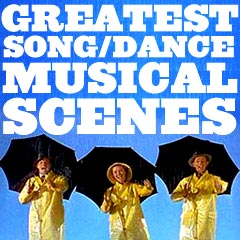
|
Musical Moments and Scenes N - O |
| N - O | |||||||||||
| Movie Title/Year and Scene Descriptions | |||||||||||

|
Director Robert Altman's country-western character study interweaved and crisscrossed the lives and destinies of 24 different characters in a free-flowing tapestry or kaleidoscope, at the time of the Bicentennial. It was one of a number of films in the late 60s and 70s that used country music as a backdrop, i.e., Bonnie and Clyde (1967), Five Easy Pieces (1970), Frankenheimer's I Walk the Line (1970) with five Johnny Cash tunes, and Daryl Duke's Payday (1972). A remarkable aspect of the film was that the cast composed their own original songs with the assistance of the film's music supervisor Richard Baskin. Twenty-seven songs appeared in the film - many of them written by the actors and/or cast members. The bicentennial film was the recipient of five Academy Award nominations - Best Director, Best Picture, Best Supporting Actress (Ronee Blakely and Lily Tomlin), with its only win for Best Original Song (I'm Easy sung by Keith Carradine). One of the musical highlights included the scene in which folk singer Tommy Brown (Keith Carradine) strummed his guitar and sang It Don't Worry Me and also delivered the seductive, Oscar-winning song I'm Easy (pictured) to a crowd - with the camera slowly showing the face of aroused audience member Linnea (Lily Tomlin) in the back. Also memorable was:
|
   
|
|||||||||
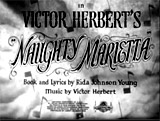
|
Naughty Marietta (1935) This box-office success, the first of the profitable MGM musicals starring MacDonald and Eddy, was a new version (directed by W.S. Van Dyke) of the 1910 operetta by Victor Herbert and Rida Johnson Young. It starred Jeanette MacDonald (as disguised 18th century French Princess Marie) and newcomer Nelson Eddy (as Captain Dick Warrington, head of a troop of mercenary scouts) in a pre-Revolutionary America setting. The best of their performed songs was Ah, Sweet Mystery of Life (pictured) - one of MacDonald's signature tunes, as well as their duet I'm Falling in Love With Someone (pictured). |
 
|
|||||||||

|
Neptune's Daughter (1949)
This musical romantic comedy from MGM studios was one in a series of films made by aqua star Esther Williams. It was typical of the romantic comedies of the time, with comic complications due to deceptive and mistaken identities. One of Williams' earliest films, her first Technicolor musical, was Bathing Beauty (1944) five years earlier, and she had also previously starred in This Time For Keeps (1947) and On an Island With You (1948). Other water-centric films in the 1950s with elaborate swimming sequences included Million Dollar Mermaid (1952), Easy to Love (1953), Dangerous When Wet (1953), and Jupiter's Darling (1955). In this one, Esther Williams starred as aquatic ballet dancer Eve Barrett, who also was a co-partner at the Neptune swimming suit design company. Co-star Red Skelton portrayed Jack Spratt, a masseur at a fancy polo club. She sang the Academy Award-winning song, a duet titled Baby, It's Cold Outside (pictured twice), with co-star Ricardo Montalbán (as love interest José O'Rourke, the handsome playboy captain of a South American polo team visiting the US). The song was also reprised (pictured) by Skelton and Betty Garrett (as Eve's sister Betty Barrett). |
  
|
|||||||||

|
Never On Sunday (1960, Greece/US) (aka Pote Tin Kyriaki)
Writer/director Jules Dassin's low-budget, black and white, Pygmalion-like romantic comedy starred Oscar-nominated (and Cannes Best Actress) Melina Mercouri as prostitute Ilya, described as the "Happy Street-Walker of Piraeus" in the film's tagline. The off-beat movie (in both English and Greek with subtitles) was set in Greece (the Athens port city of Piraeus) where the exuberant Ilya advertised her sexual wares - only "never on Sunday." In the opening pre-credits sequence (to the tune of the title song), Ilya shed her clothes as she raced down a pier and jumped in the ocean (in a black bra and panties) - followed by many other shipyard workers. The foreign film, considered controversial and the recipient of an X certificate, had five Academy Awards nominations, including Best Director, Best Actress, Best Original Story, and Best Costume Design, and won only one Oscar: Best Original Song for Never On Sunday (pictured twice) ("Ta Paidia Tou Peiraia", aka The Children of Piraeus), with music and lyrics by Greek composer Manos Hadjidakis - the film's theme song featured Greek music (highlighting the traditional bouzouki instrument played by the locals). The song was the first one from a foreign-made movie to win the Best Song Oscar. In the film, Mercouri also sang the song, accompanied by the instrumental background music playing on a small record player placed on her bed. She also danced barefooted to the music, while clicking her fingers to the beat. The film's writer-director Dassin (who later married his female star) co-starred as Homer Thrace, an uptight American tourist and classical Greek scholar from Middletown, Connecticut, whose intent was to uplift Ilya's morals, save and reform her, although her free-spirited nature was able to transform his personality. |
  
 |
|||||||||

|
New York, New York (1977)
The highlight finale of Martin Scorsese's notable musical flop, co-starring Robert De Niro (as Jimmy Doyle), was Liza Minnelli's (as Francine Evans) tremendous belted-out, show-stopping rendition of writer John Kander and lyricist Fred Ebb's iconic NYC anthem Theme from New York, New York (pictured often):
[Note: Two years later, Frank Sinatra made Theme from New York, New York a smash hit, and virtually the city's representative theme song.] Other performances included original Kander and Ebb songs such as But the World Goes 'Round (pictured) also performed by Minnelli. It was alongside other classic standards from the 20's and 30's such as:
|
     
|
|||||||||
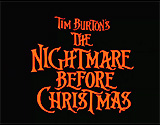
|
The Nightmare Before Christmas (1993) Tim Burton's magnificent gothic film was a combination of stop-motion animation and originally-composed spooky yet inventive musical numbers and songs (by Danny Elfman). The major character was the "Pumpkin King" Jack Skellington (voice of Chris Sarandon, singing voice by Elfman). Many amazing numbers included:
In the triumphant finale, Jack finally realized his love for patchwork girl Sally (voice of Catherine O'Hara) - with a closing kiss on a snowy curlicue hill: ("My dearest friend, if you don't mind I'd like to join you by your side, where we can gaze into the stars. And sit together, now and forever. For it is plain as anyone can see: we're simply meant to be").
|
 Jack Skellington (The Pumpkin King)   "This is Halloween"   "What's This?" - Jack's Joyous Reaction to Christmas Town  "Poor Jack " |
|||||||||

|
Nine to Five (1980) (aka 9 to 5)
Director/co-screenwriter Colin Higgins' and 20th Century Fox's feminist-leaning workplace farcical comedy was so successful that it was the basis for a short-lived ABC-TV sitcom and a 2009 Broadway show of the same name. It starred three secretaries who were harrassed by their sexist corporate boss Franklin Hart (Dabney Coleman) during their 9 to 5 job:
All three fantasized about ways to kill their boss - each one labeling him as "a lying, sexist, egotistical, hypocritical bigot": - Judy hunted him down with a rifle - Doralee hog-tied him and put him on a spit - and Violet portrayed Disney's Snow White and poisoned him with coffee. The Oscar-nominated title song 9 to 5 (with music and lyrics by Dolly Parton) (the film's sole nomination) was heard during the opening credit montage of hustle-bustle scenes (of getting to work by 9 am) - filmed and located in downtown San Francisco:
|
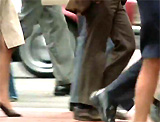 
|
|||||||||
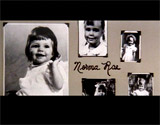
|
Norma Rae (1979)
Director Martin Ritt's acclaimed drama told about the struggles of a union organizer, the title character Norma Rae Webster (Sally Field), a factory worker in a North Carolina textile mill, who made efforts to unionize her workplace to increase wages and improve work conditions. It won two of its four Oscar nominations, also including Best Picture and Best Adapted Screenplay:
The Oscar-winning song was performed by Jennifer Warnes in the film (under the opening title credits, while displaying various scenes of the mill factory in operation followed by black and white photos in an album of the stages of the title character's life). The song was later released in another version by British pop singer Dusty Springfield and others (including Glen Campbell):
|
  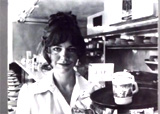
|
|||||||||
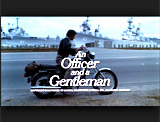
|
An Officer and a Gentleman (1982)
Paramount Pictures' crowd-pleasing romantic drama by director Taylor Hackford was about the training of US Navy Aviation officer candidate Zachary "Zack" Mayo (Richard Gere) and his on-again/off-again romantic relationship with one of the 'Puget Debs' in town -- paper factory worker-girlfriend Paula Pokrifki (Debra Winger). Of its six Oscar nominations, it won two awards:
Other nominations included Best Actress (Winger), Best Original Score (also Nitzsche), Best Film Editing, and Best Original Screenplay (Douglas Day Stewart). In the rousing, overly-sentimental, slightly-cheesy tearjerking finale (a wish-fulfillment Cinderella conclusion), graduate-trainee Ensign Zack Mayo (in his neatly-pressed naval dress whites) came up to a surprised Paula at her workplace. She turned around - startled. Then he planted a second kiss on her by grabbing her face and giving her a more intimate kiss. She placed her arms around his neck during the kiss, as he hoisted her up and spun her around. They kissed repeatedly. He grabbed her and carried her away to the exit while she was in his arms, as co-workers applauded and Paula's work friend Lynette Pomeroy (Lisa Blount) called out: "Way to go, Paula! Way to go!" The film concluded in a freeze-frame after she placed his cap on her head, with the credits displayed to the tune of Up Where We Belong (pictured numerous times), performed by Joe Cocker and Jennifer Warnes. |
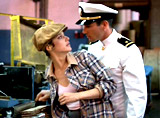   
|
|||||||||

|
Oklahoma! (1955) There were many memorable Richard Rodgers and Oscar Hammerstein II standards in this widely-acclaimed Best Score-winning film (adapting the 1943 Broadway show musical that was based upon Lynn Riggs' 1931 folk play, Green Grow the Lilacs) with Agnes De Mille's choreography. Notably, it was the first of nine Broadway shows that were created by the successful musical duo. The film's director was Fred Zinnemann - making his first musical (with a somber tone), with its exorbitant budget of seven million dollars, made it the most expensive film ever made to that time. [The film was remade for TV in 1999 starring Hugh Jackman, Josefina Gabrielle, and Maureen Lipman.] The setting was the Oklahoma Territory in the early 20th century shortly before Oklahoma statehood. It was shot on location in the new 65-mm. wide-screen (CinemaScope) technicolor process called Todd-AO and with stereo sound - and heralded in its publicity as: "A motion picture as big as all outdoors." Its opening number was of cowboy Curly McLain (Gordon MacRae) on horseback in the outdoors singing Oh, What a Beautiful Mornin' (pictured). His romantic love interest was farm girl sweetheart Laurey Williams (Shirley Jones). Other performers included Laurey's best friend Ado Annie (Gloria Grahame), and brutish farm-hand Jud Fry (Rod Steiger). The main romantic love ballad was People Will Say We're in Love (pictured), sung by Shirley Jones with Gordon MacRae. Other songs included:
|
     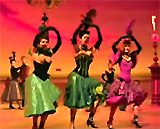 
|
|||||||||

|
Oliver! (1968, UK) Lionel Bart's musical version of the Charles Dickens novel "Oliver Twist" was about a poorhouse orphan Oliver's (Mark Lester) travails in early 19th century London. Oliver! was both a British production and a Broadway hit - as well as a Best Picture-winning film (from first-time musical director Carol Reed who won Best Director). The film featured the large production number - the welcoming Consider Yourself (pictured) sung by The Artful Dodger (Jack Wild) and the Chorus: It provided many memorable songs, including:
|
 "Consider Yourself"  "Food, Glorious Food"   "Where is Love?" |
|||||||||
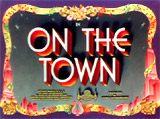
|
On the Town (1949)
This fresh, kinetic and innovative landmark MGM musical was co-directed by Stanley Donen and Gene Kelly with lyrics by Betty Comden and Adolph Green, and Leonard Bernstein's music from the Broadway stage musical of 1944. This musical masterpiece won the Oscar for Best Musical Score (its sole nomination), by Roger Edens and Lennie Hayton. The film also marked the first time that actual locations were used for musical numbers:
The sailors also experienced all the sights of the city with their new girlfriends:
The film's reprise of the title theme song and dance - New York, New York (pictured) was performed by the three couples on the Empire State Building's rooftop and on a street level sidewalk. |
       
|
|||||||||

|
Once (2006/2007, Ire.)
Tucked into writer/director John Carney's wistful romantic musical was a charming duet at the piano between:
Together, they sang the Oscar-winning Best Original Song tune Falling Slowly (pictured) while in a nearly-empty music store (he played guitar while she joined him on a piano) -- among the film's many songs. |
 
|
|||||||||

|
Orchestra Wives (1942) This non-Technicolored 20th Century Fox musical featured Glenn Miller and his Orchestra (for the second and last time). It recalled the Big Band era of music and swing jazz (following the previous year's Sun Valley Serenade (1941)), with renditions of Harry Warren's music. Gene Morrison (with the same initials GM) starred as Glenn Miller - the leader of the film's fictional band. The musical was re-released by Fox twelve years later at the time of director Anthony Mann's biopic The Glenn Miller Story (1954), starring James Stewart as the famous band leader. Musical numbers included:
The film also featured one of the famed Nicholas Brothers' best dance numbers (pictured), after they reprised the singing of I've Got a Gal in Kalamazoo, with lots of high-flying wall-jumps and splits. |
 
|
|||||||||
(alphabetical by film title) Introduction | A-1 | A-2 | B-1 | B-2 | B-3 | C-1 | C-2 | D-1 | D-2 | E | F-1 | F-2 | G-1 | G-2 H-1 | H-2 | I-J | K | L-1 | L-2 | M-1 | M-2 | N-O | P-1 | P-2 | R-1 | R-2 | S-1 | S-2 | S-3 | T | U-V | W | X-Z |